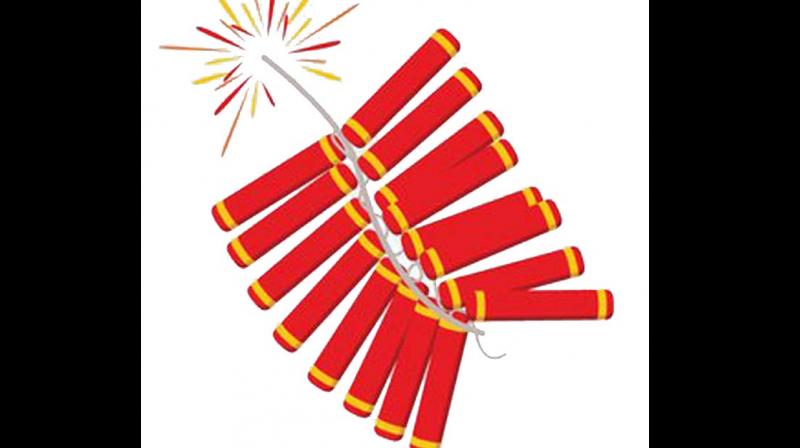Namma Chennai diary: A less bright Deepavali for the greater good
It would be hard to convince GenNext why they can't enjoy what previous generations did for a couple of hundred years.

What does one make of the ban on firecrackers (in fact, all fireworks are banned) ordered by a judicial fiat sometime last year in New Delhi and the NCR and reinforced by angry judges. The idea seemed contagious enough for other high courts to follow and some states have declared their opposition to making the already toxic air of our cities more harmful. But, is a less bright Deepavali all that bad for those who live in these areas, except that their freedom to celebrate in certain manner is being taken away from them? There is the greater good to think of.
The thing about most bans in India is you can't enforce them. The illegal drug industry thrives, so too does the gutka market and the hooch industry in states that have banned liquor. The virtue of absolutism is not for us in a land in which respect for law is notoriously weak, beginning with the highest in the land to those hanging on to the lowest rungs. They will be bursting crackers and lighting fireworks in the capital and elsewhere too. Would the administration dare to arrest kids simply because they are holding a kambi mathappu (sparkler) in their hands?
It would be hard to convince GenNext why they can’t enjoy what previous generations did for a couple of hundred years. Of course, the issue may not arise at all as there may be a way to escape the ban. One of the confusing clarifications issued is that people who bought them before the ban on sales was imposed can go ahead and burst or burn them as they please. This is like saying that while there is a ban, it’s not all that serious. So good luck to anyone wishing to interpret the law on that day or enforcing the ban so solemnly handed down.
History tells us that the festival springs from the return of Lord Rama after his conquest in Lanka and that diyas were lit to mark the occasion. Even if for a moment we believe this comes from fact and not from Sanskrit ithihasa, at least we should accept that the celebration in those times could only have been by lighting lamps. The destructive ways of modern society with its cordite, its gunpowder and its firepower came much later, with firecrackers said to have originated in China. It’s a nice ecological conservation principle to recognise but hard to convince everyone in today’s setting to say they can’t celebrate by letting off fireworks or bursting crackers once in a year for this big festival. And by no means are crackers burst only for Deepavali. Celebrating with fireworks is far more widespread and it’s done in temple festivals too.
We do, however, know that the people of New Delhi and surrounding areas have to sacrifice their celebration for the greater good. Their air has gained notoriety greater than Beijing’s but, unfortunately, there are no easy, democratic ways to deal with the problem out here. But then ask them to try and stop the diesel smoke-belching lorries, autorickshaws and two-wheelers which have scant regard for the environment than the cars you can regulate with rigid pollution standards. And then the farmers burn the residue of their harvest in setting light to the stubble and making it the mother of all pollutants of the air even as the construction industry spews venom in the form of all those PM 2.5 kind of pollutants that hit the lungs.
Powerless as regimes are in controlling any of those many factors that go into fouling up the air, they still have to contend with the knotty problem of enforcing a ban on Deepavali fireworks. It's just that we a mixed-up society that has often to be told by the judiciary that we are not thinking enough to be able to make a difference. Around the world, controlled fireworks let off on special occasions like New Year’s Eve are a government-monitored activity. We emulate it somewhat in the Ram Leela but there is no way to make fireworks a community activity on the special days that are marked for the festival of lights on the designated days depending on what the almanacs say for each region.
It might be a muted Deepavali for the firecracker industry in Sivakasi and their North Indian dealers who stocked up before the ban was extended. Dealers in Chinese firecrackers would also be affected even if the contours of the ban are not going to be rigid. A large number of the younger generation have been sensitised to child labour and have disavowed crackers far earlier in their lives than members of preceding generations. Even so, a ban can bring out the worst of defiance in human beings and it would be unrealistic to believe it would be a silent Deepavali in the capital. Of course, it would be nice to spare a thought to ecology and light less fireworks in celebration of the festival of lights and also ease off the eardrum-testing explosive firecrackers. A slightly less bright Deepavali will indeed be for the greater good.

